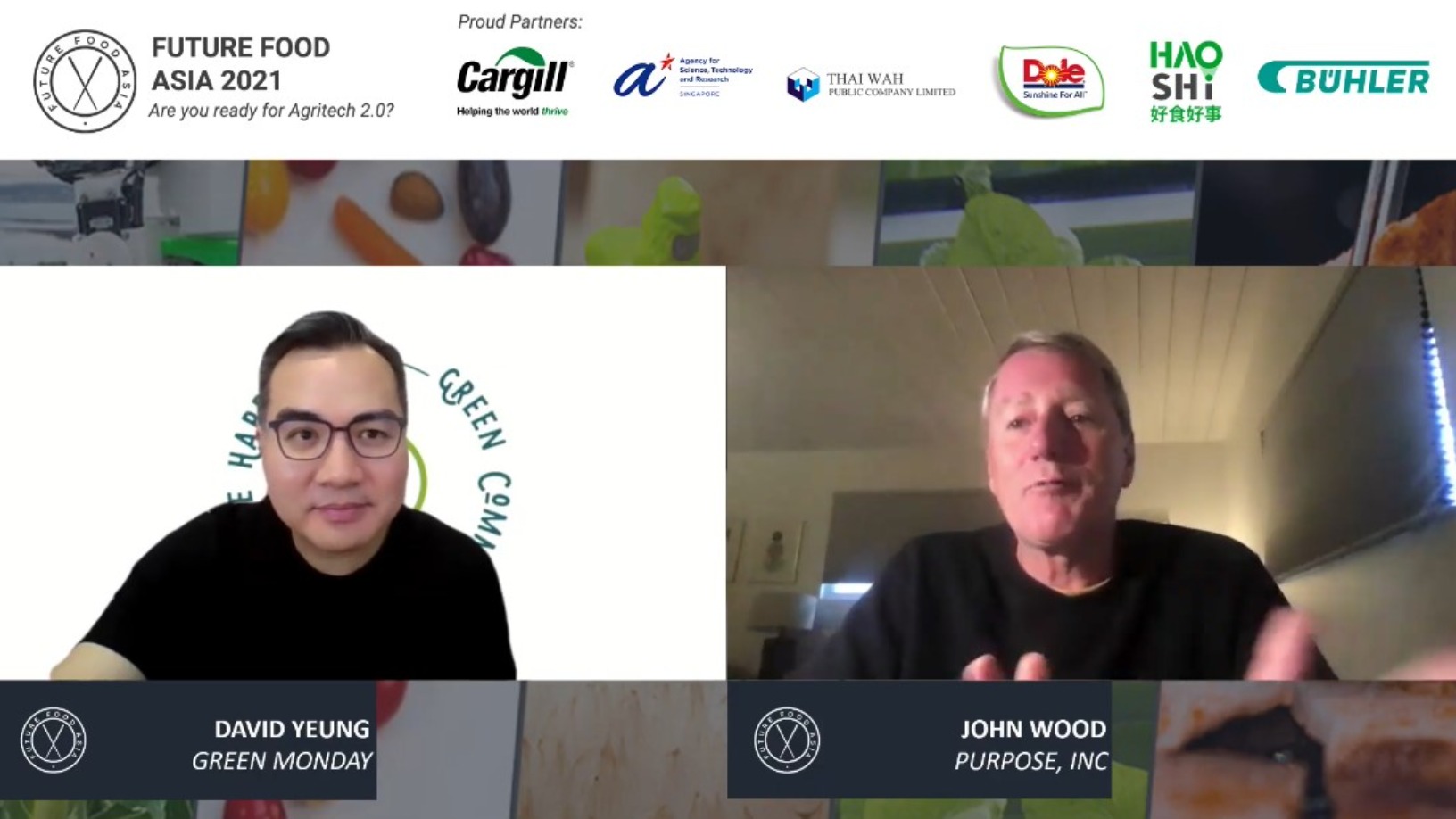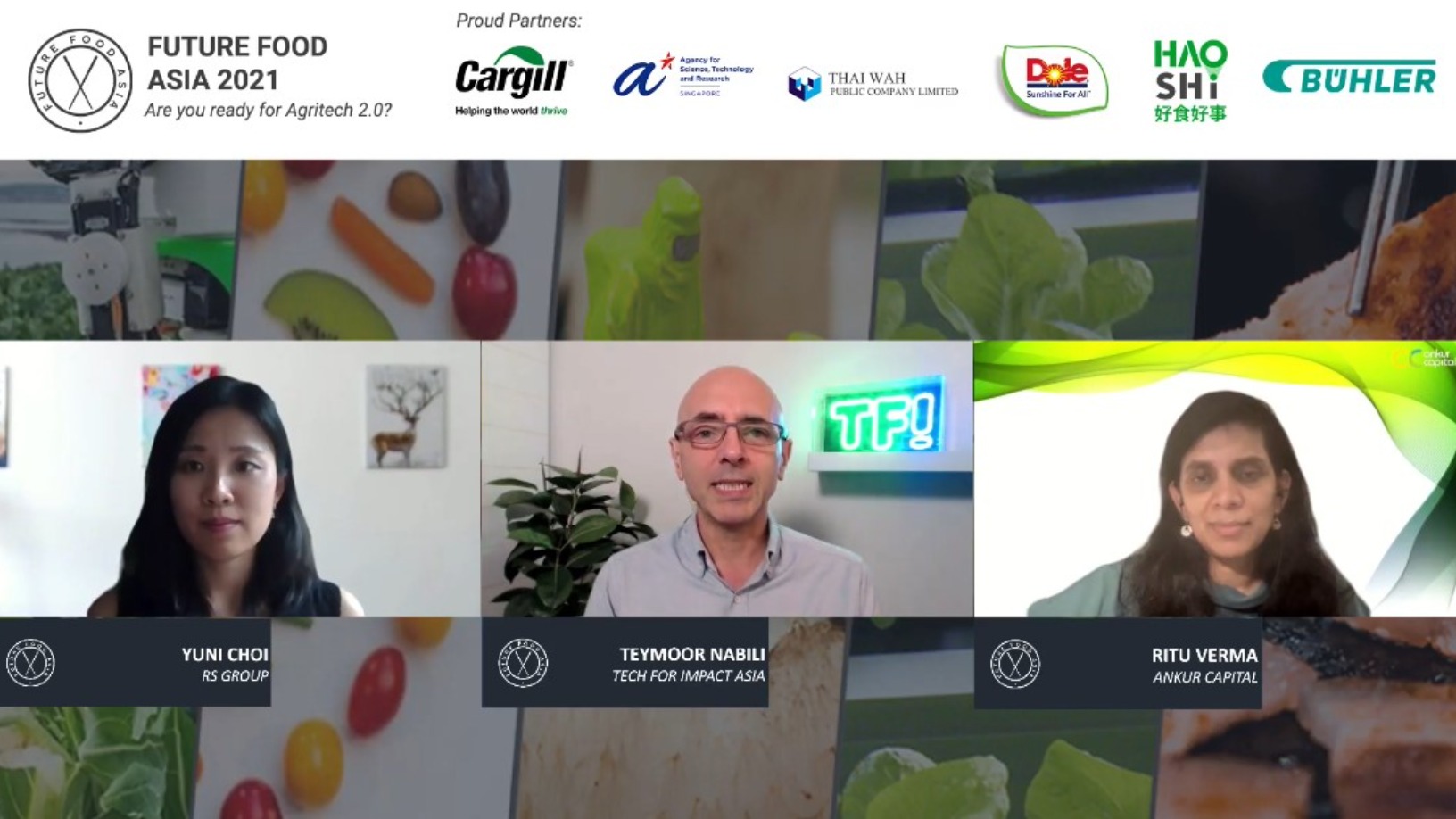After the launch of its well-known OmniPork series in 2018, Hong Kong-based Green Monday introduced a new product line, OmniSeafood, into the market this month. With 40,000 points of sales in over 20 markets, consumers worldwide will have a chance to taste the full range of plant-based seafood products made from non-GMO soy, pea and rice, but Green Monday is more than a plant-based meat business.
CEO and founder David Yeung, who has been a vegetarian for the past 20 years, kicked off Green Monday as a purpose-driven business nine years ago because he had always cared about animal welfare and climate change. Since then, Green Monday has grown into a multi-faceted social venture.
“We have OmniFoods focused on alternative protein innovation, Green Common, which is our showcase shops and restaurants in Singapore, Hong Kong and Shanghai, and also the Green Monday movement that advocates people to go green and plant-based at least one day a week,” Yeung said at the recent Future Food Asia 2021 virtual conference organized by ID Capital from June 7–10.
Yeung shared the story of Green Monday and how it has made continuous efforts to change more people by raising consumer awareness, localizing its products and lowering prices at a fireside conversation titled Made in Asia, Serving the Globe: Business with a Purpose with John Wood, founder of award-winning international education organization Room to Read, and also a board member and investor of Green Monday.
The following discussion has been edited for length and clarity.
John Wood: What was the genesis of this new product line OmniSeafood? How did it happen?
David Yeung: Since we launched OmniPork in 2018, many people have been asking what's next. We are headquartered in Asia, and we are naturally looking at the biggest protein consumption. In terms of land animals, pork is by far the most consumed meat, apparently, in China. But seafood consumption in Asia is also staggering, accounting for 73% of the global total. But at the same time, issues like marine degradation, overfishing and pollution are beyond alarming. Many people are waking up to the fact that our ocean is devastated, which is hurting us in so many ways. We cannot talk about climate change without taking care of the ocean. Those are all the reasons behind OmniSeafood.
These products are good for the planet. In terms of health, are they good for us?
That is a major emphasis of our group. We have so many dietitians and nutritionists on board to make sure that we create truly healthier choices, not only the meat counterparts but also some of the other products in the space. For an individual consumer, health will be one of the key reasons, besides good taste and good texture, why they decide to switch [to plant-based meat]. Whether it’s OmniPork or OmniSeafood range, the products are high protein and non-GMO. We don't have to worry about hormones and antibiotics, as [our products] come from natural ingredients, including non-GMO soy protein, rice and mushroom.
North Americans and Europeans eat a lot of beef, while over 5bn people in Asia eat a lot more pork. That's an interesting market opportunity you've been targeting for three years. Tell us a little bit about pork. How many different product derivations are there?
Since OmniPork was launched three years ago, we have been humbled by the market’s receptiveness. OmniPork is now available at Starbucks in China, McDonald's in Hong Kong and mainland China, 7-Eleven stores in many different countries, and hotel cafes and retail channels. We are available in over 20 markets, near 40,000 points of sales. The response has been great. Now, we have OmniPork Mince and OmniPork Strip, while many people have a special craving for our vegan OmniPork Luncheon. This is a kind of cultural craving. In places like Hong Kong, Singapore, and South Korea, luncheon meat is a big thing that people incorporate into various daily diets. So, to have a much healthier choice is becoming very appealing to a lot of people here.
How do you localize your products in the heart of Asia, where cuisines are quite different from country to country?
Localization is critical. We cannot just assume what sells well in Taiwan will sell in Thailand, for example. So, we’re creating different forms and applications using the Omni ingredients and make them something that can resonate with different local audiences. Even with dumplings, the ones we do in Taiwan are slightly different from what we do in mainland China.
Asian plant-based brands have always stated that they differentiate themselves from Western brands to cater to Asian palates and cuisines. Do you think this will still be important as the industry develops and evolves?
Yes, that's always going to be important because we will not eat homogeneous food on a global level, and we need differentiation. Even the pizza in New York is not the same as the pizza in Chicago. We are doing work regularly to fulfill the palate. After launching a product, we still need to continue to fine-tune and upgrade it. People stick with a food product for a long time because it hits the perfect spot with their palate. With plant-based products, we need to strive for the same goal. Many of these products are novel and new, so it will take a few iterations before reaching that spot.
Even with dumplings, the ones we do in Taiwan are slightly different from what we do in mainland China
You'll be soon rolling into other countries, including the US and UK. Can you tell us what your expansion plans are?
We already have been doing some soft launches in California and Hawaii, but the official launch is coming in the third quarter this year. By then, Omni products will be in Whole Foods Market and Sprouts [Farmers Market] stores across the nation.
We actually had a lot of momentum going on in the UK market right before Covid-19 hit. We have some of the most iconic restaurants in London that are now launching menus featuring Omni products. The launch on the retail side will come at the end of the third quarter or the beginning of the fourth quarter. But we are already available online.
You made a conscious decision not to produce plant-based chicken or plant-based beef, but you've still found a way to find some financial upside in those markets through Green Monday Ventures. Tell us more about that.
No company can do everything, and this was the fundamental understanding from day one. No matter how hard we work, no matter how fast our innovation team continues to develop great products, there's no way we can develop the whole portfolio. There are going to be great products developed globally by different entrepreneurs and companies. Why not team up with them, and why not invest in them and create strategic partnerships? Over the years, we have made investments in and also partnered with brands such as Beyond Meats, Califia Farms and Alpha Foods, which cover burgers, sausage and chicken nuggets. This enables our restaurant partners or end consumers to choose from a wide range of products. Consumers need variety, and food is definitely something that people want to have more options and choices.
You mentioned that you have the equivalent of an Apple showroom, and you're doing that with restaurants. What’s that strategy?
We have nine Green Common restaurants in Hong Kong, and one in Singapore and one in Shanghai. Altogether we have 11 new plant-based food innovation showcases for both dining and grocery shopping. These new products and brands are novel, and many people may have just read about them on the news or heard about them from a panel discussion but have not tasted them yet. Before they shop it online or buy it and cook it at home, it’s critical to have such a place that lets them know what it tastes like and its possibilities. Green Common serves that purpose. That broad portfolio of brands will help attract customers through the door. Our main goal is to change people, whether it is one day, two days or five days a week; let's shift the ratio of what we eat.
There is more money than ever flowing into the space. Green Monday raised a pretty big round in the fourth quarter of last year. Can you tell us a little bit about that?
We raised $70m last September, and actually, we added a little bit more to it since then. During this particular period, awareness is rising. Covid has definitely brought awareness of ESG to the scene. Because of Covid, investors from both public and private sectors look at ESG as the core thesis of how they invest. Not that long ago, even back in 2018, when we first launched Omni, it took a lot of time for me to explain to people why we were doing and what we did. It was nowhere close to the level of awareness and optimism today.
Do you foresee plant-based diets becoming unsustainable at some point, and is there anything we can do to mitigate that?
If the plant-based industry becomes unsustainable, the human race will become unsustainable. Whether it's land use, water consumption or greenhouse gas emission, plant-based options are 80–90% better. We live in a very volatile world, not to mention we are still in Covid right now. And all these have major impacts on our produce and our crops. If we continue to rely on factory farming and overfishing, we will be put in an even more vulnerable situation. Plant-based products are not perfect, but at least provide a significant upgrade in terms of sustainability.
You've said we're going to get OmniPork to the point where it has price parity with the real product. Is that possible?
We are lowering the price and just made a price reduction announcement about three or four weeks ago. It’s the second time that we are making a significant price drop, around 22%. We start from Hong Kong and will gradually scale this across the global markets that we are in. When Omni was born three years ago, and the scale was small, we were nowhere near optimizing supply chain and production. At that time, the unit cost was more expensive. But when you look at the picture from a macro standpoint, the plant-based meat space significantly shortens the supply chain. We are taking animals out of the equation. There's absolutely no reason why plant-based protein will not be cheaper than animal-based protein down the road. It is only a matter of time and a matter of scale and on a company-by-company basis.
If the plant-based industry becomes unsustainable, the human race will become unsustainable
With the opening of your new plant in China, how will the scale of OmniPork change?
It actually changes a lot. For the domestic mainland China market, we are shortening the logistics. Sometimes, especially during the pandemic, our import of food into different countries can be very tricky. We used to have our products stuck at a port for two months because of backlog. When your products get stuck at a port for two months, you have two fewer months to sell them because they have expiry dates. So, with multiple production plants, we can lower these external costs involving logistics and custom. Some of that is money-related, and some time-related. It helps optimize production and the supply chain.
If you look at your business, five to 10 years from now, what do you see as the big things that will help Green Monday continue to see massive growth?
A few days ago, Credit Suisse published a report that says the plant-based industry will grow 100 times by 2050. We need to look at the macro picture. Our population is increasing; we have 8bn people today and 10bn very soon; we are running out of resources; we are running out of food. In terms of the ocean, we cannot just overfish how we do right now and assume that fish will naturally grow. In fact, there is a 10-year fishing ban in the Yangtze River in China because the government knows that it's time to restore nature and the marine ecosystem. Those are the reasons why there's so much optimism around us. Whether it is Green Monday or other players in the space, we need to work very hard. We are very optimistic that change is happening. One of the key encouraging signs is that young people are driving this, and they're the ones who are most concerned about climate change and the future of the planet as a whole.
What are you most happy about where we are right now in the whole green food movement? Are you satisfied that we're making the right amount of progress?
I'm encouraged because these conversations are taking center stage. The awareness was non-existent not that long ago. But at the same time, we also need to accelerate this momentum and this impact because we are dealing with global crises here, and the clock is ticking. We, collectively as an industry, need to accelerate our momentum even more.
Is there anything happening in this industry that annoys you?
There's a long list. Changing people is hard. It’s natural that people have inertia and have resistance to change. Despite many scientific facts and nutritional data, and even great products, there are just people who will be naysayers. Another thing that is also frustrating is the fact that we are talking about an international community. You're in California right now, and more progressive change is happening there. But it doesn't mean another state in the US or another country in Asia is immediately getting that ripple effect of that movement. To go into each country, we need to respect the culture there and adapt to that. Asia is a gigantic continent with almost 60% of the world’s population, but the reality is each culture is different. I won't say it’s frustrating, but we need to respect each culture and their diet habits. It’s not easy and takes time.
Do you find being purpose-driven is a competitive advantage for you as you seek out employees or business partners? What role does that play?
It plays a huge role. A huge percentage of our colleagues working not just in Hong Kong but in different parts of the world used to just cold message us via LinkedIn or email, saying they really resonated with our mission. They loved our products and stores and wanted to be part of this team. When they come to work each day, they know they're not just reporting or just chasing numbers but making a difference. That obviously gives them the extra motivation and alignment, which makes a company great. So, from the standpoint of talent acquisition, I think that's what people really look for. Monetary return and financial upside are clearly important, but people are looking for more. Being purpose-driven becomes one of the biggest competitive advantages of a company.
CompassList is an official media partner of Future Food Asia 2021










